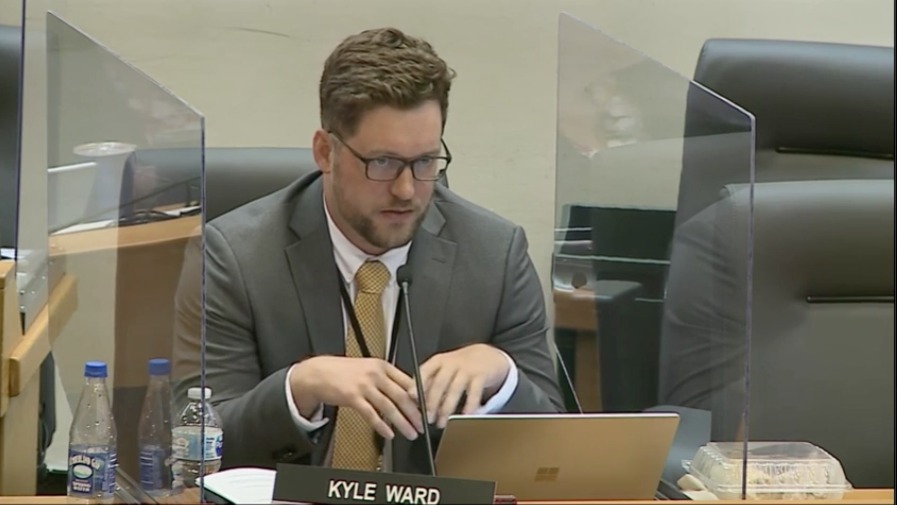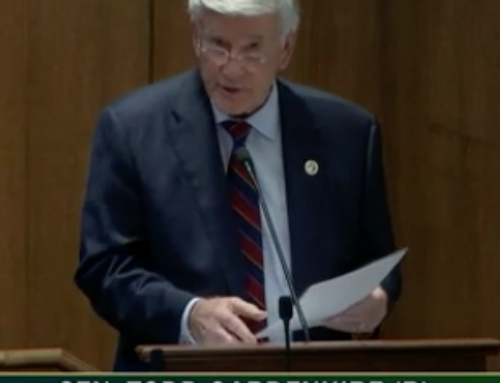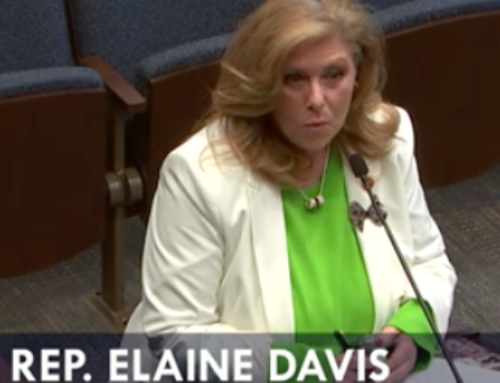The Knox County Commission is proposing an ordinance that would create a new central repository on its website for all public and legal notices required by law, with the idea that it might be able to eliminate the expense of buying ads in local newspapers to publicize items like upcoming meetings, tax-delinquent sales and government bid opportunities.

Knox County Mayor Glenn Jacobs wants to eliminate spending on ads that would publicize meetings, delinquent tax sales, bid opportunities and other items, and instead post all the notices on its website in one place.
County Mayor Glenn Jacobs said in a statement published by online news site Compass that he thinks it’s antiquated to put public notices in a newspaper “especially when you have to pay for it” when “everyone is getting their news on social media and free news websites.”
The fiscal note for the ordinance says that the county could save $25,000, but notes this is on the low side because the county does not know how many public notices would be allowed to be posted only on the county website and not in a newspaper.
The ordinance passed on first reading at the commission’s Monday night meeting and will be set for a vote in June. (View the meeting discussion here.)
Ordinance would prohibit putting public notices in a paid-subscription newspaper
The ordinance has two parts, establishing an online repository for all the county’s public and legal notices, and mandating that any public notices required by state law to be published in a newspaper of general circulation be published in a free newspaper.
In Knoxville, that would mean the county would no longer be allowed to publish any public notices in the Knoxville News Sentinel and would have to use a newspaper that is free to residents, like the weekly Knox Focus, for its ads.
According to reporting by Jesse Fox Mayshark at Compass (a paid subscription online news organization in Knoxville), Knox County has placed notices for items such as public meetings, sales of tax-delinquent properties and bid solicitations in two local newspapers: the Knoxville News Sentinel and Knox Focus.
Over the past two years, the Knoxville News Sentinel has received the bulk of the business at $225,000 in invoices, while Knox Focus has received just under $7,000. The county reasons in its ordinance proposal that if the public notice is in the free newspaper, it would reach an “expanded audience.” The county provided no data on the difference of audience reach between a free newspaper or a newspaper that has paid subscribers.
News Sentinel argues its audience reach, including digital, is larger
New Sentinel Publisher Joel Christopher pushed back, noting that the county would be reaching fewer members of the community if it took public notices out of the News Sentinel and required them to be only in a free publication. It would also reach a smaller audience if it just posted public notices on its own website, he said. The News Sentinel reaches a much larger audience in print and online, he said.
He told Commission Chairman Larsen Jay in an email that “small private outlets and the public sector will never be able to match the digital reach of a news organization like the News Sentinel, which has advantages of search primacy online and distribution in print that can’t be replicated by other private or public options.”
He also noted that public notices and legal notices are not behind a paywall on the news website. Also, any public notices published by the newspaper are simultaneously published in a statewide free public notice website operated by the Tennessee Press Association. The site is searchable by county and city, and by word phrases. The press association publishes notices from all newspapers of general circulation, including those who are not members of the association, like the Knox Focus.
Commissioners hope to stop paying for ads to publicize meetings, tax sales, land use changes
Knox County already posts agendas for upcoming meetings on its website. It also posts on its website delinquent tax sale information, solicitations and open bids, but they are in different places on the site. It’s not clear what new would be posted, but presumably it would all be available from a central place on the county’s website.

Knox County Commissioner Kyle Ward hopes more legislation is passed that lifts requirements of governing bodies to purchase ads for public notices and other legal notices.
But some county commissioners appear to have a bigger aim in sight: Eliminating the purchase of ads altogether for public and legal notices.
During the Monday night county commission meeting, Commissioner Kyle Ward referenced legislation passed by the General Assembly this year that allowed a certain type of public notice published in newspapers to be published online. That legislation allowed the state to put notice of sunset review hearings for state agencies on the state’s website and remove the requirement that the state put notice of the hearings in newspapers in the state’s major metro areas.
Ward said that he expected that lawmakers will introduce more legislation next year that would presumably remove requirements that governing bodies purchase ads to notify the public, and said the proposed local ordinance would allow the government more control over the notices. He said he expected all public notices would be only on the government website within the next few years. He characterized the ordinance as providing more transparency.
Commission Chair Jay told Compass that he hoped the ordinance would be the first of many steps to eliminate all spending on public notices for “Knox County, the Trustee, zonings and land use items.”
Open Meetings Act requires adequate notice of meetings
At issue is the best way to notify the public of upcoming meetings and other government information required to be publicized by law.
Some items are required by a specific statute to be published in a newspaper of general circulation. Examples including public hearings for rezoning issues, budget information and other potentially controversial items.
As for public meetings, the Open Meetings Act says that “adequate notice” must be given of all governing body meetings, but it does not specify what type of notice that is.
In interpreting what constitutes adequate public notice of meetings, the Tennessee Supreme Court has said the notice must “fairly inform the public.”
“…adequate public notice means adequate public notice under the circumstances, or such notice based on the totality of the circumstances as would fairly inform the public.” (Memphis Publishing v. City of Memhis, 1974)
Later, the Court of Appeals said that issues “of pervasive importance” required more notification and the court established a three-prong test for special-called meetings that said:
- Notice must be posted in a location where a member of the community can become aware of such notice.
- The contents of the notice must reasonably describe the purpose of the meeting or the action proposed to be taken.
- The notice must be posted at a time sufficiently in advance of the actual meeting in order to give citizens both an opportunity to become aware of and to attend the meeting.
Legal opinions have said that the method of notices must be consistent so the public knows where to find them. And in 2011, the Office of Open Records Counsel advised against posting notices of meetings on a website only, taking into account that not everyone has the ability to access a computer and access a website.
Notably absent from any court interpretations of adequate notice are factors of cost or expediency to the government. In other words, the cheapest or most expedient way is not always the best way to reach the widest public audience.



